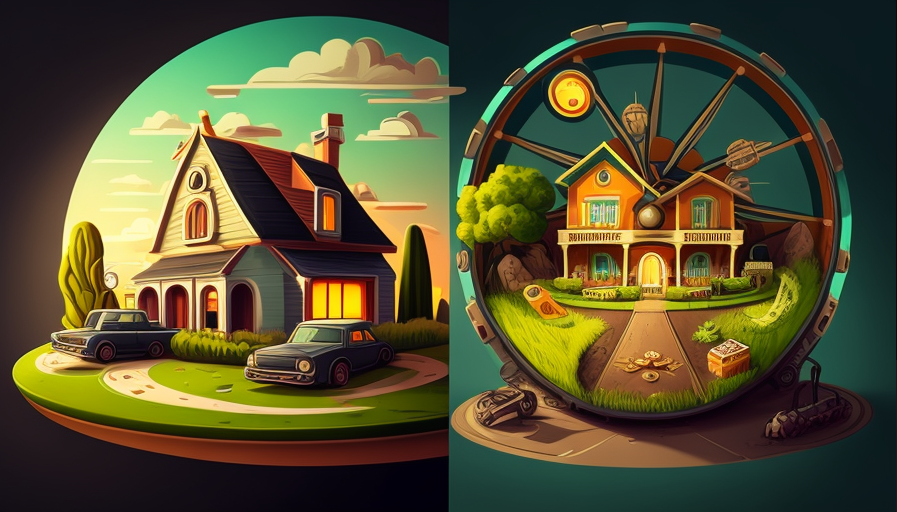When most people think about insurance, they don’t immediately think about gambling. However, the two industries share more similarities than you might think. Both insurance and gambling involve taking risks and paying premiums or bets in the hopes of receiving a payout.
Table of contents
Here are some of the surprising similarities between insurance and gambling:
1. Both involve risk
Insurance and gambling both involve risk.
With insurance, you are paying a premium to protect against a potential loss or damage. You are essentially placing a bet that something bad will happen to you or your property, and you want to be covered if it does.
In gambling, you are also placing a bet, but the risk is different. Instead of protecting yourself against a potential loss or damage, you are taking a chance on an uncertain outcome with the possibility of winning or losing.
However, both insurance and gambling require you to weigh the potential risk against the potential reward. In the case of insurance, the reward is the peace of mind that comes with being protected against a potential loss or damage, while in gambling the reward is the potential payout or jackpot.
2. Both require a payout
Both insurance and gambling involve the concept of payout. In insurance, you pay a premium to an insurance company, and in exchange, the company agrees to provide financial compensation in the event of a loss or damage. The payout is designed to help you recover from the financial impact of a loss, and may include repairs to your property, replacement of lost or damaged items, or compensation for medical bills or other expenses.
In gambling, the payout is the potential reward for taking a risk. You place a bet on an uncertain outcome, and if you are lucky, you may win a prize or a jackpot. However, there is always a chance that you will lose your bet and not receive any payout at all.
Both insurance and gambling require you to consider the potential payout when deciding whether or not to participate. With insurance, you must weigh the cost of the premium against the potential payout you could receive in the event of a loss or damage. In gambling, you must weigh the potential payout against the risk of losing your bet.
It is important to note that while both insurance and gambling involve payout, they are fundamentally different. Insurance is designed to provide financial protection in the event of a loss, while gambling is a game of chance that involves the risk of losing your bet.
3. Both have odds
Both insurance and gambling involve the concept of odds. In insurance, the odds are based on statistical analysis and actuarial science. Insurance companies use data on the frequency and severity of losses to calculate the likelihood that a policyholder will experience a loss or damage. This allows them to set premiums that reflect the risk of a claim being made. The odds of a payout depend on the policy and the specific circumstances of the loss or damage.
In gambling, the odds are based on the probability of a particular outcome. The odds are used to determine the potential payout of a bet, with lower odds typically resulting in a higher payout. For example, if you place a bet on a roulette wheel and choose a specific number, the odds of that number coming up are typically around 1 in 38. If your number does come up, you may receive a payout of 35 to 1.
While both insurance and gambling involve the concept of odds, they differ in their purpose and approach. Insurance is designed to protect against a potential loss or damage, while gambling is a form of entertainment that involves the risk of winning or losing money. The odds in insurance are based on statistical analysis, while the odds in gambling are based on probability.
4. Both involve chance
Both insurance and gambling involve the concept of chance. In insurance, the chance of a loss or damage occurring is based on a variety of factors, including the insured property, the policyholder’s location, and the frequency and severity of similar claims in the area. While insurance is designed to protect against unexpected events, there is always a chance that a loss or damage will occur.
Similarly, gambling involves the concept of chance, as the outcome of a particular bet is uncertain and unpredictable. While some forms of gambling, such as poker or sports betting, involve an element of skill, most forms of gambling are based purely on chance. The chance of winning or losing a bet depends on a variety of factors, including the odds of a particular outcome and the actions of other players or participants.
Both insurance and gambling involve the concept of chance, but they differ in their purpose and approach. Insurance is designed to protect against unexpected events, while gambling is a form of entertainment that involves the risk of winning or losing money. While insurance involves taking calculated risks based on statistical analysis, gambling involves taking risks that are based purely on chance.
5. Both involve a contract
Both insurance and gambling involve a contract between two parties. In insurance, the contract is between the policyholder and the insurance company. The policyholder pays a premium in exchange for the promise of coverage in the event of a loss or damage. The terms of the contract, including the coverage provided and the premiums charged, are outlined in the insurance policy. Both parties have certain obligations under the contract, including the policyholder’s obligation to pay premiums and the insurance company’s obligation to provide coverage.
Similarly, gambling involves a contract between the bettor and the gambling establishment or other participants. The terms of the contract, including the amount of the bet and the odds of winning, are usually agreed upon in advance. The contract is fulfilled when the outcome of the bet is determined, and the bettor either wins or loses the bet. Both parties have certain obligations under the contract, including the bettor’s obligation to pay the bet and the establishment’s or other participants’ obligation to pay out winnings if the bettor wins.
Both insurance and gambling involve a contract between two parties, but they differ in their purpose and approach. Insurance is designed to protect against unexpected events, while gambling is a form of entertainment that involves the risk of winning or losing money. The contract in insurance is typically much more complex and regulated than in gambling, due to the potential for large payouts and the need for careful risk management.
Differences between insurance & gambling
Although insurance and gambling share some similarities, there are significant differences between the two.
- Purpose: The primary purpose of insurance is to protect against unexpected events that can result in financial loss or damage. On the other hand, gambling is primarily a form of entertainment that involves taking risks with the possibility of winning or losing money.
- Risk Management: Insurance companies use risk management techniques to reduce the potential for losses, such as underwriting policies based on statistical analysis, setting premiums based on risk factors, and diversifying their portfolios. In contrast, gambling does not involve risk management techniques, as the outcome is based purely on chance.
- Guaranteed Payment: Insurance policies guarantee payment in the event of a loss, provided the policyholder has met the terms of the contract. In gambling, there is no guarantee of payment, as the outcome is uncertain.
- Legal Regulation: Insurance is heavily regulated by state and federal laws, with strict requirements for licensing, solvency, and consumer protection. Gambling is also regulated, but the laws vary by state and the regulation is often less strict.
- Ethics: While both insurance and gambling involve taking risks, insurance is generally considered a socially responsible activity as it protects individuals and businesses against unexpected events. Gambling, on the other hand, is often viewed as socially irresponsible and can lead to addiction, financial hardship, and other negative consequences.
Overall, while there are some similarities between insurance and gambling, the differences in purpose, risk management, guaranteed payment, legal regulation, and ethics make them distinct activities.

Wrap-Up
In conclusion, the similarities between insurance and gambling may be surprising, but they exist nonetheless. Both involve taking risks and paying premiums or bets in the hopes of receiving a payout. However, the differences between the two industries are also significant. Insurance is designed to protect against losses, while gambling is primarily for entertainment. Understanding the similarities and differences between insurance and gambling can help you make informed decisions about your financial and personal risk management.
FAQ
Both insurance and gambling involve taking risks, whether it’s betting on uncertain outcomes or protecting against potential losses or damages.
In insurance, the payout refers to the financial compensation provided by the insurer in the event of a covered loss or damage. In gambling, the payout is the potential reward for winning a bet or game.
Both insurance and gambling involve odds, which determine the likelihood of a certain outcome occurring. In insurance, odds are based on statistical analysis, while in gambling, they reflect the probability of winning or losing a bet.
Insurance and gambling both involve contracts between two parties, outlining terms such as coverage, premiums, and payouts. However, insurance contracts are typically more complex and regulated than those in gambling.
While both activities involve risks and payouts, insurance is primarily for financial protection against losses, whereas gambling is entertainment with uncertain outcomes. Additionally, insurance involves risk management and is heavily regulated, while gambling is subject to varying degrees of regulation.


